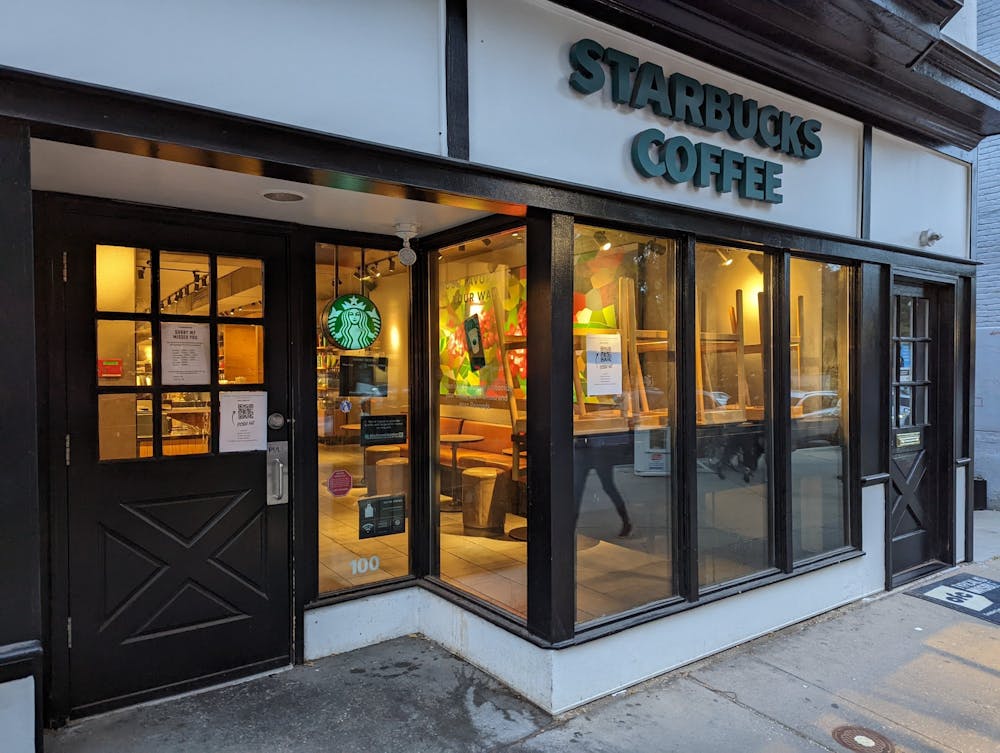The Nassau Street Starbucks has been severely understaffed since the beginning of the school year, resulting in decreased hours and sudden store closings. Weekday hours have been reduced to 8 a.m. to 1 p.m.
These issues occur in the wake of unionization at the Hopewell Starbucks, the first location in New Jersey to unionize, and the rapid increase in Starbucks unions nationally. Recently, flyers reading “No Contract, No Coffee,” urging students to support Starbucks Workers United (SWU), the same organization fighting for better pay and benefits in Hopewell, have been put up around campus.
Bryce Springfield ’25, a member of Democratic Socialists of America (DSA), has promoted SWU through flyers and campus outreach as part of the work of the Central New Jersey Chapter of DSA.
“A major goal of DSA is to support labor efforts — not only in organizing unions and winning union elections, but also helping workers through the process until they get a contract,” he said in an interview with The Daily Princetonian.
With a frequently short-staffed location across the street from campus, DSA’s promotion of SWU is focused on “try[ing] to get students involved in supporting people who work at Starbucks locations,” Springfield said.
Despite efforts to improve working conditions via unionization from SWU, the current employees seeking work face serious struggles.
While employees used to receive their schedules up to two weeks in advance, changes in operating hours have left employees with fluctuating, uncertain schedules. A minimum number of employees are required to operate the store during a normal shift, so occasional store closures have resulted from staff unavailability. Procedures like new staff training and store cleaning require the store to be closed, which also reduces the available operating hours.
For Nubia Morales ’25, a Starbucks barista, the “hours are very unreliable.”

“It used to be two weeks in advance or a week in advance, but because the [operating] hours change within the week, sometimes I won't get the hours that I need,” she said.
Morales has also worked at four other Starbucks locations. She said that Nassau’s location was “the busiest [she’s] ever worked at.”
Recently, the store closed unexpectedly for a day after a store supervisor caught COVID-19.
“If there's no one that could cover and there's not enough people to run the Starbucks that day, then we will close for that day,” Morales said.

She also pointed out that once the store was kept open during a new barista’s training, “which is not usually how Starbucks trains partners, but in this location, it's the only way it works.”
Some baristas noted that their hours have changed due to other employees suddenly not coming into the store, or some temporary summer employees, like high school students, no longer being available to work.
“There was this one mass quitting, where seven people left … I think it was a lot of people fed-up with working hours, pay, and not enough benefits,” Maddy Heyler ’25 said, who worked at the store last semester.
To combat understaffing, Starbucks typically contacts other partner stores in the area for more temporary employees. However, workers at other branches are warned about the customer base at the Nassau Street Starbucks.
“With all the other baristas that I've talked to who work in New Jersey, not just at this location, this location has had the most difficult customers to deal with,” Morales said.
Starbucks employees must work an average of 20 hours a week in order to receive benefits over a 6-month period. As a result, student employees at Starbucks find that the store's demands and Princeton’s academic workload are incompatible. According to Morales, the store currently has only three Princeton student employees.
“[With] the new policy, where you need to work 18 hours a week … it makes being a student and working there very, very hard,” explained Nick Masters ’25, a former employee at Starbucks.
“Students work at Coffee Club, and that is much more of a Princeton-centered, socially more aware campus group, because people that come in are typically students,” Heyler said.
The understaffing that has affected Starbucks has not been seen by Coffee Club. In fact, in their most recent round of hiring, Coffee Club had 75 applicants for 25 available slots, according to Manager Paige Silverstein.
Reflecting on the disparity between Coffee Club and Starbucks, Masters said, “if Starbucks wasn't as understaffed, I think more people would be willing to [work there]. But right now, with the way things are, it wards people off.”
Sara Mughal, SWU organizer and employee at the unionized Hopewell Starbucks, explained that most of the workplace problems do not exist in a vacuum.
“The problems snowball, and it gets so crazy. The company could prevent it [but] they don't, and it keeps happening,” Mughal said.
As for unionizing at the Nassau Street Starbucks, current and former employees described discussions that took place following nationwide unionizations.
“We were all ears about it, but not really talking about it when there were people nearby,” Morales said.
However, unionization at the Hopewell location nearby encouraged conversation, she added.
“I have noticed that this conversation has gotten less and less scary after people bringing it up more often, and I think that was because we did hear about the [Hopewell location] unionizing.”
Unionization, for Masters, is a potential fix to the problem of understaffing, making the store a more attractive place for student employees.
“It may attract new employees to a point where they can finally go back to their normal schedule and not have people working from open to close, because that's the problem right now,” he said.
Julian Hartman-Sigall is a news and podcast contributor for the ‘Prince.’ He can be reached on Twitter @Julian_h_s, on Instagram @julianhartman, or jh8991@princeton.edu.
Isabel Yip is an Assistant News Editor who typically covers University Affairs and student life. She can be reached at isabelyip@princeton.edu or on Instagram at @isaayip.








